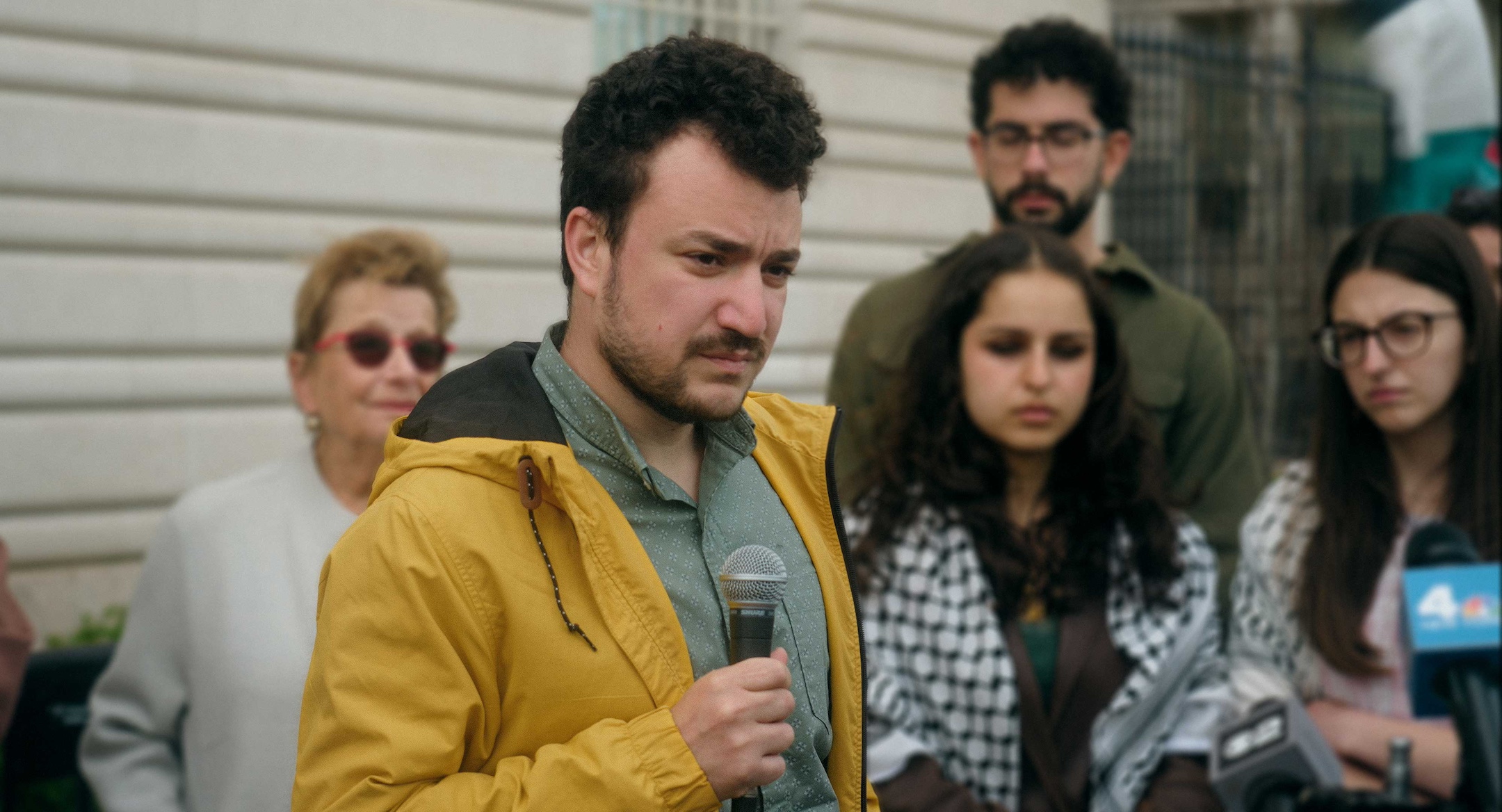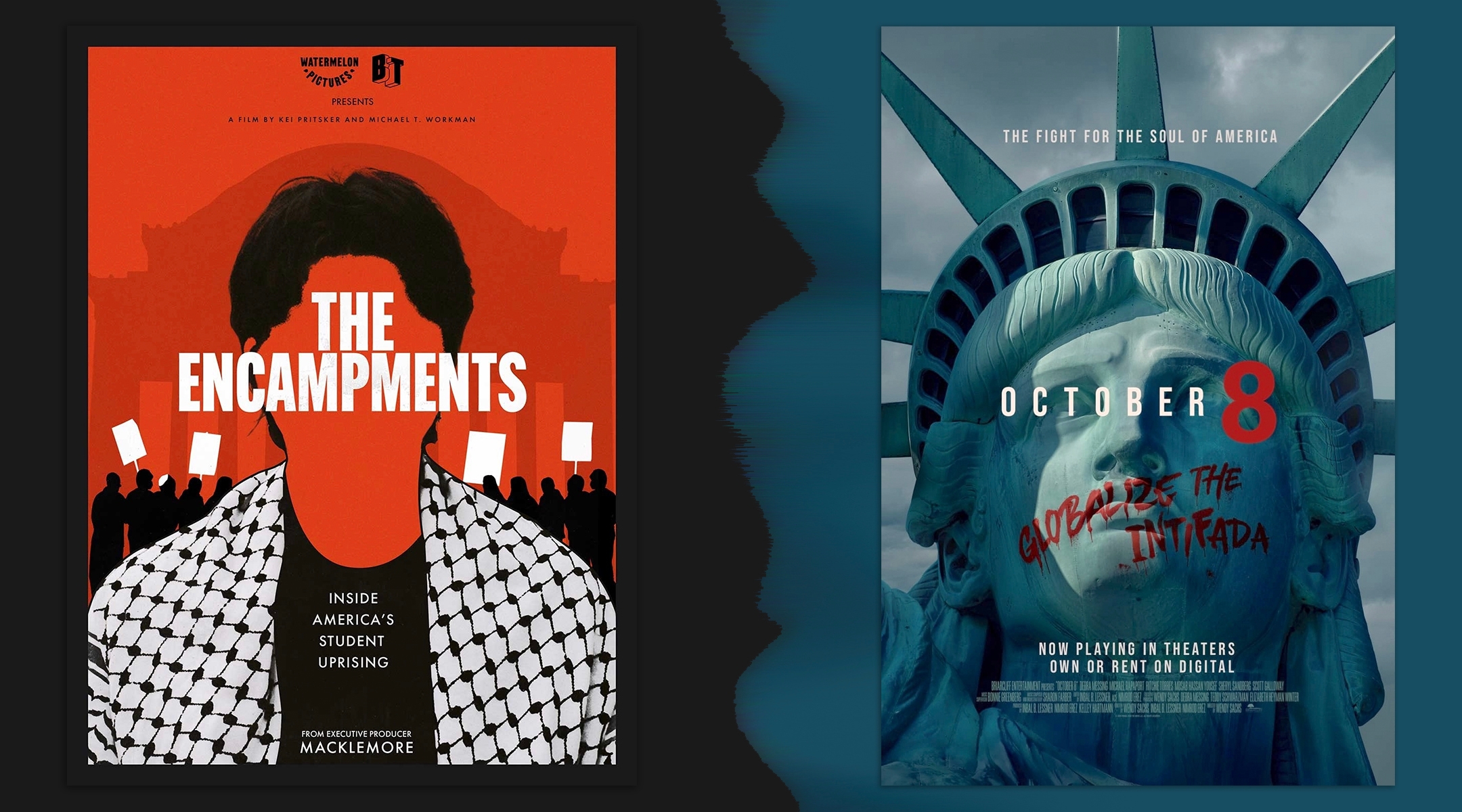George Orwell disliked peace propaganda as much as he disliked war propaganda. Like war propaganda, he wrote, peace propaganda “concentrates on putting forward a ‘case,’ obscuring the opponent’s point of view and avoiding awkward questions.”
I spent an Orwellian few days watching new documentaries about Oct. 7 and its aftermath, specifically on how the Hamas attacks in Israel and the fallout from Israel’s war in Gaza played out in the United States. “October 8,” a film about how American Jews experienced the fierce and at times antisemitic backlash to Israel and the war, and “The Encampments,” an intensely sympathetic portrait of the anti-Israel protests at Columbia University, fit Orwell’s gripe to a T. Neither even acknowledges that there may be a different point of view, and the awkward questions are left to cranky viewers like me, who have to look for the answers elsewhere.
The films’ one-sided arguments thus raise a few questions of their own: Who are these films for? Are they meant to persuade, and if so, persuade whom? Who are the hypothetical viewers who care enough about the issue to watch films like these and haven’t already made up their minds?
Of course, persuasion may be beside the point. It might be more useful to compare “October 8” and “The Encampments” to religious services, where the faithful go to validate their beliefs and seek healing in the company of other believers.
“October 8,” executive produced by the actress Debra Messing and directed by Wendy Sachs, describes the explosion of anti-Israel activism that to many Jews felt indistinguishable from antisemitism, because in many cases it was. The most compelling segments of the film focus on Jewish college students who found themselves on the wrong side of the Israel question — in this case, of the side of not hating Israel.
“October 8” is effective at reinforcing the ways anti-Zionism can be antisemitic. Students such as Tessa Veksler, student body president at UC Santa Barbara, describe being harassed, ostracized and spit on for holding the controversial notion that Israel is a legitimate state and that the slaughter of civilians is not a legitimate form of resistance. A campaign sought to oust her from her position. If you find yourself asking, “Well, aren’t some of these kids pro-Israel activists?” you’ve already accepted the pernicious notion that on American campuses, at least, freedom from harassment belongs only to those on the “correct” side of the issue.

Tessa Veksler, who as student body president at UC Santa Barbara was targeted for her pro-Israel views, tells her story in “The Encampments.” (© 2025 Briarcliff Entertainment. ALL RIGHTS RESERVED)
The film tackles a few issues that belong in another film, if at all. There’s a segment on The New York Times’ flawed coverage of the explosion at Al-Ahli hospital in October 2023 that suggests an episode of journalistic malpractice is the real source of Israel’s problems. Unfortunate references to Nazi Germany are made in ways that only invite the charge that Jews “instrumentalize” the Holocaust to score points against Israel’s critics.
And as others have pointed out, there is only the barest mention of the enormous civilian death toll in Gaza, or acknowledgement that any of the campus protesters might have genuinely been motivated by anything other than anti-Jewish animus. (The filmmakers go to great lengths to establish a tie between Hamas and Students for Justice in Palestine, often the main organizers of the protests, suggesting the college encampments were bought and paid for by the terror group.)
The testimony of Israeli survivors of Oct. 7 is harrowing, as is the footage of kibbutzim ravaged by the invasion and of the makeshift memorial at the site of the Nova music festival massacre. Sachs has said her goal was to “make a film that spoke to a global audience so they can understand what modern-day antisemitism looks like, and how anti-Zionism has really become the modern-day form of antisemitism.” I wonder how much it would have helped her case to also show the Israeli Jews who have wrestled with the war’s aims, or the hostage families who have protested their government’s actions, thereby demonstrating the diversity of Israeli society and showing how one can criticize Israel without calling for its dissolution.
“The Encampments” tells a similarly one-sided story — if a clever editor were to splice the two films together, the result might be a documentary that told a truer, more complex picture of the events of the past 18 months. Produced and distributed by Watermelon Pictures, which aims to “reflect the perspectives and experiences of Palestinians,” “The Encampments” is a hagiographic depiction of the pro-Palestinian protesters at Columbia. The film is framed around the events of April 2024, when the protesters first set up tents in the university quadrangle and were ultimately shut down when they took over a campus building.
There are long sequences showing drum circles and tables of food shared during the protest, and historical footage of Vietnam-era demonstrations. The talking heads include Mahmoud Khalil, the protest leader who, nearly a year after the shooting of the film, was arrested by ICE and sent to a Louisiana detention facility pending deportation. In the film, Khalil comes off as a softspoken, non-belligerent leader who is seeking justice for his friends and family in Palestine.

Mahmoud Khalil, the Columbia University student activist who led campus pro-Palestinian rallies and is now resisting the Trump administration’s efforts to deport him, is shown in a scene from “The Encampments.” (Courtesy Watermelon Pictures)
Other protesters are louder and more aggressive — although not too aggressive: There is no footage, like that shown in “October 8,” showing protesters taunting Jewish students and calling for Israel’s elimination, or pro-Hamas imagery justifying and glorifying the attacks. “The Encampments” focuses mostly on the students’ demands, not their slogans, especially that Columbia divest from companies that do business with Israel.
The film also fetishizes the Jewish students who took part in the encampment, lingering on their yarmulkes and Passover celebrations. Grant Miner, a Jewish union activist expelled by Columbia last month for his pro-Palestinian activism, is interviewed extensively. Their presence is noted as proof that the protests could not have been antisemitic if they included Jews. Like “October 8,” “The Encampments” doesn’t include any perspective from the other side — in this case, from Jews who felt threatened by the aggressive, disruptive protests and the “no-Zionist” zones — except to preemptively invalidate them. (Since his arrest, Khalil has charged that pro-Israel Columbia students “manufactured safety concerns regarding antisemitism.”)
Also like “October 8,” the film is most effective when the cameras move to the Middle East. There is agonizing footage of Gazan residents living in actual tent cities and the rubble of what had been their homes. Both films speak most eloquently when the war’s victims — a kibbutznik, a young Palestinian woman — can do nothing but silently weep.
Would that one side could witness the other’s tears. What both films lack is empathy. They depict the conflict as a zero-sum game, in which talking about the other side’s pain is conceding the argument.
That’s not to argue for “objectivity,” which posits that the writer or filmmaker is a disinterested observer only trying to get at a journalistic truth. All of art is persuasion, as Orwell also argued. But there is persuasion and there is propaganda. One invites a conversation. The other shuts it down.
JTA has documented Jewish history in real-time for over a century. Keep our journalism strong by joining us in supporting independent, award-winning reporting.






